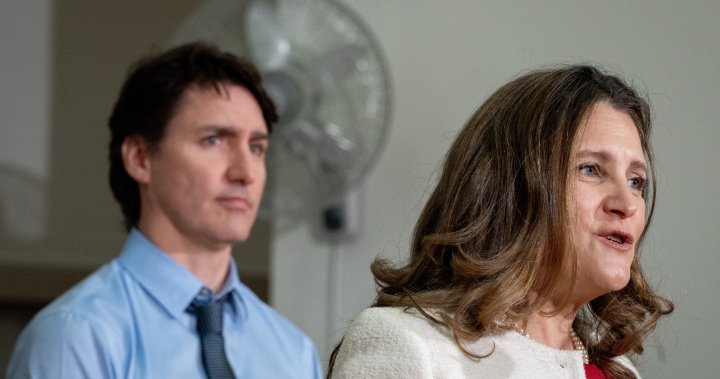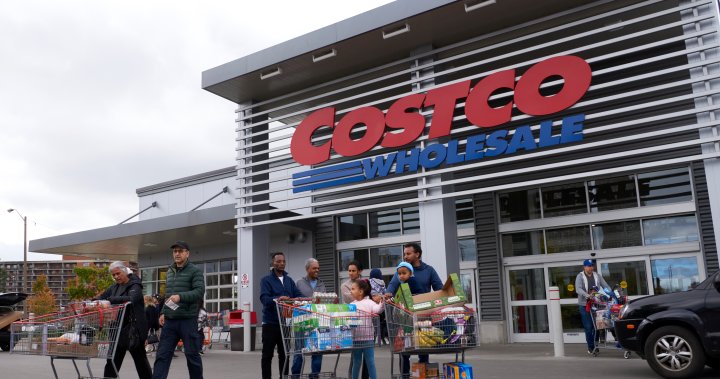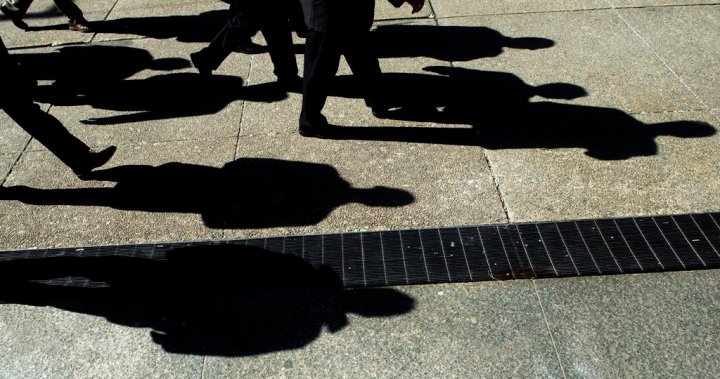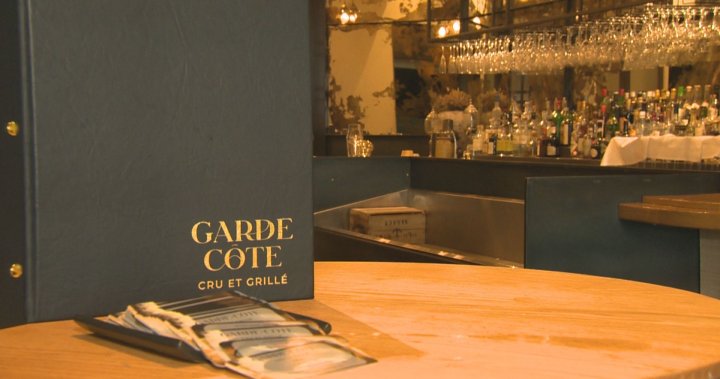Canadians are mostly looking for help paying their bills in the 2024 federal budget, not investments in the military or clean energy transitions, according to polling released Friday.
The Ipsos poll conducted exclusively for Global News surveyed 1,000 Canadians between March 15 and 18 about what their top three priorities were for the upcoming federal budget, set to be tabled by Finance Minister Chrystia Freeland on April 16.
The cumulative top priority for those polled was help with the rising cost of living (44 per cent).
Women (53 per cent) more so than men (36 per cent) rated cost-of-living support as a priority. Half of gen X respondents (those born between 1965 and 1980) said they were looking for pocketbook help in the budget, the highest proportion of any generation.
“Pocketbook issues dominate the list of the things that Canadians want to see addressed in the budget,” Sean Simpson, senior vice-president at Ipsos Global Affairs, tells Global News.
He says he sees a clear focus among voters on taxes, affordability and other household finances in the polling.
“All those issues, in some way, shape or form, are tied to the amount of money that Canadians have that seems to be draining from their wallet at record speeds these days,” Simpson says.
The other budget line item garnering significant interest is investments in health care, with 38 per cent of respondents ranking it as a priority.
Financial news and insights
delivered to your email every Saturday.
But when asked about a hypothetical hike of one per cent in the GST to fund services like pharmacare – the framework for which the Liberals have introduced as part of their supply-and-confidence deal with the NDP – only five per cent of those surveyed said they saw it as a priority.
Instead, more Canadians are signalling that they’re hoping for a reduced tax burden from Ottawa.
One in three respondents said they’d like to see a cut to their personal tax rates included in the 2024 budget, while one in five said they want the Liberals to freeze the federal carbon price, which rose on April 1. The planned increase spurred countrywide protests that halted traffic on major Canadian roadways.
Some 19 per cent said they wanted to see the Liberals reduce their overall spending, while 18 per cent signalled reducing the federal deficit should be a priority for Ottawa this spring.
But like Canadians, the federal government is finding it has less cash on hand to meet its own rising costs, including servicing debt under the weight of higher interest rates. The parliamentary budget officer said in a report last month that the slowing economy and rising debt costs are leaving Ottawa with little fiscal wiggle room heading into the 2024 budget.
Prime Minister Justin Trudeau and Liberal MPs have been on a cross-country tour teeing up line items in the budget related to Canada’s housing market, affordability and homebuilding efforts.
Some 15 per cent of respondents to the Ipsos poll said they’d like to see measures that will cool the housing market in the federal budget, while 12 per cent indicated that funding to build new homes was a priority.
Only five per cent of respondents said an increase in the GST rebate for homebuyers was a priority, though that rose to 10 per cent of gen Z respondents (born between 1997 and 2005).
Other priorities, such as increasing defence spending and accelerating the transition to clean energy, ranked lower on Canadians’ lists:
- Investing in Canada’s Armed Forces and defence (11 per cent)
- To support the transition to greener energy (10 per cent)
- Incentives to lower their carbon footprint (nine per cent)
- Help businesses struggling with the pandemic impact (eight per cent)
- Freeze hiring in the federal public service (six per cent)
These are some of the findings of an Ipsos poll conducted between March 15 and 18, 2024, on behalf of Global News. For this survey, a sample of 1,000 Canadians aged 18-plus was interviewed. Quotas and weighting were employed to ensure that the sample’s composition reflects that of the Canadian population according to census parameters. The precision of Ipsos online polls is measured using a credibility interval. In this case, the poll is accurate to within ± 3.8 percentage points, 19 times out of 20, had all Canadians aged 18+ been polled. The credibility interval will be wider among subsets of the population. All sample surveys and polls may be subject to other sources of error, including, but not limited to coverage error, and measurement error.
© 2024 Global News, a division of Corus Entertainment Inc.




